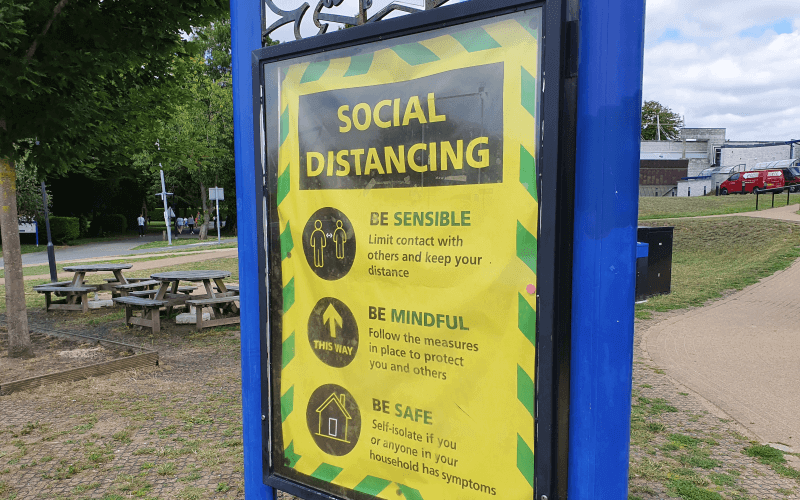Two national disabled people’s organisations have questioned why the “humanist” aspirations of the Welsh government were unable to prevent “mass death and real suffering” during the pandemic.
Disability Wales and Disability Rights UK were delivering their opening statement to the section of the UK Covid inquiry examining decision-making and political governance in Wales.
Two-thirds (68 per cent) of the people who died of Covid in Wales were disabled people, even higher than the nearly six out of 10 across the UK, while people with learning difficulties were between three and eight times more likely to die of Covid in Wales than non-disabled people.
They suggested that the higher number of disabled people who died in Wales was due to how many older Welsh people have respiratory diseases caused by working in the coal mines.
In their statement (PDF), delivered on their behalf by barrister Danny Friedman, the two disabled people’s organisations (DPOs) asked why the Welsh government failed to do more to prepare itself to protect a population that it knew was “older, poorer”.
They said the Welsh government’s pandemic plan was no better than the UK government’s, despite its commitment to comply with the UN Convention on the Rights of Persons with Disabilities.
Disability Wales and Disability Rights UK told the inquiry that the Welsh population of disabled people was “seriously compromised in its resilience” because of austerity, while Brexit “had soured relations and monopolised resources”.
The two DPOs also pointed to serious errors by the Welsh government, including mistakenly assuming at first that food packages for those who were shielding would be distributed by the UK government, and introducing testing in care homes later than other parts of the UK, even though its experts “knew that care homes would be the greatest places of risk”.
And they highlighted the limitations of devolution, telling the inquiry: “Welsh government may have political commitment to developing equality and human rights, but it is not straightforward to create those things when so much of Welsh public law and economics remain part of the law and economics of England.”
But they said the Welsh government had proved better than other parts of the UK at partnering with its people.
Civil servants from the Welsh government approached DPOs in mid-March 2020 to “find out what the government needed to learn”, with regular meetings between DPOs and Jane Hutt, the deputy first minister and chief whip, starting in early April.
They said this was “fundamentally different from what the UK government did” and also contrasted with how the Scottish government “disengaged from civil society groups in the first weeks of the crisis”.
The Welsh government also commissioned a study of the effects of the pandemic response on disabled people, led by DPOs, which became the Locked Out report, and subsequently set up a Disability Rights Taskforce following one of the report’s recommendations, action which was “unprecedented” in the UK.
Despite this, the two DPOs told the inquiry that “relying too heavily on good relations was not enough”.
Without a dedicated minister for disabled people, “what worked was left too much to chance, based on the accident that Jane Hutt was committed to make things happen, which might equally have led to different outcomes if certain core personalities, like her, were not in place”.
The statement also highlighted how a medical model approach to disability made a “considerable comeback” in Wales during the pandemic, including in the way that “do not attempt resuscitation” notices “proliferated in an unaccountable fashion”.
This was highlighted by letters issued by a GP surgery in Maesteg, which suggested to some older, frail and disabled people that it was better to use resources on the young and fit, who were said to “have a greater chance” of survival if infected.
The two DPOs concluded: “Despite awareness of the risks, the issues already seen elsewhere in the UK, including lack of access to food and essential resources, collapse of health, care and independent living services, and the suspension of disabled people’s rights, all happened here.
“That lack of protection in what is otherwise a progressive state committed to the social model creates puzzles for this inquiry, including for those advocating for a change of values as important in its own right.”
Friedman told the inquiry on Tuesday: “Disabled people across the four nations have suffered because inequalities have been allowed to grow… Covid was not the great leveller of inequality and division, it was the great revealer of those things.
“Disabled people constitute the lived (and deceased) evidence of that reality.”
A note from the editor:
Please consider making a voluntary financial contribution to support the work of DNS and allow it to continue producing independent, carefully-researched news stories that focus on the lives and rights of disabled people and their user-led organisations.
Please do not contribute if you cannot afford to do so, and please note that DNS is not a charity. It is run and owned by disabled journalist John Pring and has been from its launch in April 2009.
Thank you for anything you can do to support the work of DNS…

 Disabled people receiving care were ‘ignored by design’ during the pandemic, Covid inquiry hears
Disabled people receiving care were ‘ignored by design’ during the pandemic, Covid inquiry hears ‘We will not give a single inch,’ disabled activists vow, as Kendall publishes disability cuts bill
‘We will not give a single inch,’ disabled activists vow, as Kendall publishes disability cuts bill Rebel Labour MPs send final warning to ministers before disability cuts bill is published
Rebel Labour MPs send final warning to ministers before disability cuts bill is published